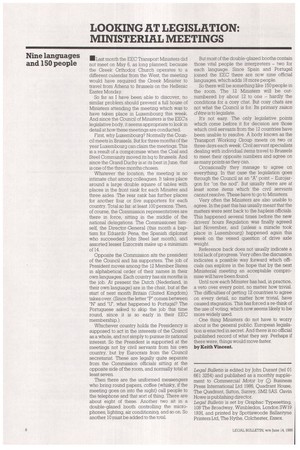LOOKING AT LEGISLATION: MINISTERIAL MEETINGS
Page 30

If you've noticed an error in this article please click here to report it so we can fix it.
Nine languages and 150 people
III Last month the EEC Transport Ministers did nut meet on May 6, as long planned; because the Greek Orthodox Church operates to a different calendar from the West, the meeting would have required the Greek Minister to travel from Athens to Brussels on the Hellenic Easter Monday.
So far as I have been able to discover, no similar problem should prevent a full house of Ministers attending the meeting which was to have taken place in Luxembourg this week. And since the Council of Ministers is the EEC's legislative body, it seems appropriate to look in detail at how these meetings are conducted.
First, why Luxembourg? Normally the Council meets in Bnissels. But for three months of the year Luxembourg can claim the meetings. This is a result of a compromise when the Coal and Steel Community moved its hq to Brussels. And since the Grand Duchy is at its best in June, that is one of the three months chosen.
Whatever the location, the meeting is no intimate chat among colleagues. It takes place around a large double square of tables with places in the front rank for each Minister and three aides. The rear rank has further places for another four or five supporters for each country. Total so far: at least 100 persons. Then, of course, the Commission representatives are there in force, sitting in the middle of the national delegations. The Commissioner himself, the Director-General (this month a baptism for Eduardo Pena, the Spanish diplomat who succeeded John Steel last month), and assorted lesser Eurocrats make up a minimum of 14.
Opposite the Commission sits the president of the Council and his supporters. The job of President moves among the 12 Member States in alphabetical order of their names in their own languages. Each country has six months in the job. At present the Dutch (Nederland, in their own language) are in the chair, but at the start of next month Britain (United Kingdom) takes over. (Since the letter "P" comes between "N" and "U", what happened to Portugal? The Portuguese asked to skip the job this time round, since it is so early in their EEC membership.) Whichever country holds the Presidency is supposed to act in the interests of the Council as a whole, and not simply to pursue its national interest, So the President is supported at the meetings not by civil servants from his own country, but by Eurocrats from the Council secretariat. These are legally quite separate from the Commission officials sitting at the opposite side of the room, and normally total at least seven.
Then there are the uniformed messengers who bring round papers, coffee (whisky, if the meeting goes on into the night) call people to the telephone and that sort of thing. There are about eight of these. Another two sit in a double-glazed booth controlling the microphones, lighting, air conditioning, and so on. So another 10 must be added to the total. But most of the double-glazed booths contain those vital people the interpreters two for each language. Since Spain and Portugal joined the EEC there are now nine official languages, which adds 18 more people.
So there will be something like 150 people in the room. The 12 Ministers will be outnumbered by about 12 to one hardly the conditions for a cosy chat. But cosy chats are not what the Council is for. Its primary raison d'être is to legislate.
It's not easy. The only legislative points which come before it for decision are those which civil servants from the 12 countries have been unable to resolve. A body known as the Transport Working Group meets on two or three days each week Civil servant specialists dealing with individual items travel to Brussels to meet their opposite numbers and agree on as many points as they can.
Occasionally they manage to agree on everything. In that case the legislation goes through the Council as an "A" point Eurojargon for "on the nod". But usually there are at least some items which the civil servants cannot resolve. These have to go to Ministers.
Very often the Ministers are also unable to agree. In the past this has usually meant that the matters were sent back to the hapless officials. This happened several times before the new drivers' hours Regulation was finally agreed last November, and (unless a miracle took place in Luxembourg) happened again this week on the vexed question of drive axle weight.
Reference back does not usually indicate a total lack of progress. Very often the discussion indicates a possible way forward which officials can explore in the hope that by the next Ministerial meeting an acceptable compromise will have been found.
Until now each Minister has had, in practice, a veto over every point, no matter how trivial. The difficulties of getting 12 countries to agree on every detail, no matter how trivial, have caused stagnation. This has forced a re-think of the use of voting, which now seems likely to be more widely used.
One thing Ministers do not have to worry about is the general public. European legislation is enacted in secret. And there is no official published record of what they say. Perhaps if there were, things would move faster.
by Keith Vincent.






















































































